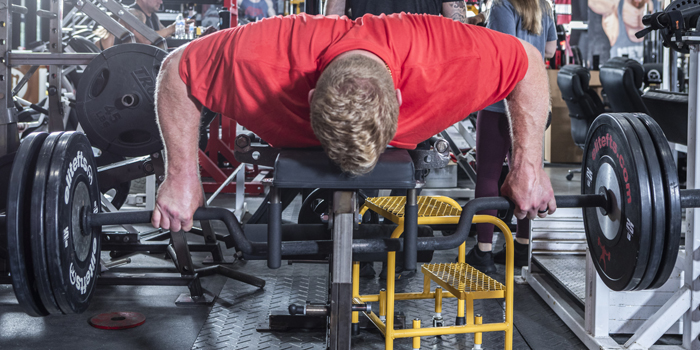
I've been at this lifting game for a long time and have learned a lot. My hunger for knowledge allowed me to become one of the best powerlifters in the world. Even though my days of chasing insane strength are behind me now, I still love lifting. I am still training hard and learning every day. I try to remind myself of my early days and all the mistakes I made to gain that knowledge. These days, my focus is on helping other lifters avoid some of my mistakes. In this article, I will cover four mistakes I continue to see.
1. No Real Understanding of How to Perform Correct Technique
Let's start with the lack of technique. I preach over and over how important technique is, but it often falls on deaf ears. It's like lifters don't think about it and have no real understanding of how to perform correct technique.
It's ironic that athletes in almost every other popular sport seek out coaching. We see tennis coaches, golf instructors, boxing coaches, swimming coaches, etc. In some sports, coaching is broken down into specific areas or movements. There are hitting, fielding, pitching, lineman coaches, and more. When it comes to lifting, we go to our gym bro, read an article in a magazine, or click on a YouTube video. Most of this is just for motivation, which is crap.
Some lifters might go to a seminar, but most lifters want to spend their money on magic supplements, motivational T-shirts, or performance-enhancing drugs (PEDs). We need to look at ourselves as strength athletes, with ATHLETES being the keyword.
It is not just about pounding metal at the gym, seeing who can beat themselves up the most. The goal is to lift the most weight we possibly can, so we must see ourselves as athletes. The proper technique in lifting is every bit or maybe even more important than hitting a ball or throwing a pitch.
Take the time, spend the money, and put in the work to understand correct technique. It is the foundation that will allow you to gain significant strength.
It was a key factor in my powerlifting career. I was willing to take a few steps back in the beginning to learn it. Those small steps back set me up for greatness later.
With good technqiue, you'll:
- Lift the most weight with your strength.
- Make consistent gains.
- Better identify weak points and how to strengthen them.
- Prevent injury and minimize severity if they do happen.
- Keep your body and joints as healthy as possible.
Find someone successful that you believe and trust, then listen to them. Put the same effort and energy you use lifting into mastering technique.
2. Too Impatient and Set Unrealistic Goals
The second mistake is being too impatient and setting unrealistic goals. I see this way too often and it just sets lifters up for failure before they even get started.
Listen, this is a sport of attrition. We build up strength through a long sustained attack and consistent pressure. It does not come from an atomic bomb. Gaining strength is about the long haul and putting in the work.
If you think you're going to go from a 225 bench to 500 in a year, you're going to be very disappointed.
It is pretty much the same way with gaining muscle, losing weight, gaining weight, or getting lean. Why do people think they can put on 70 pounds of body weight over 15 years and think they can take it off in a month? Goals are again part of building that foundation for our future in strength sports.
Don't sell yourself short. I am all for big goals, but you need realistic ones. I like to set up a realistic short-term goal, a long-term realistic goal, and it-would-be-awesome-to-hit-####-if-everything-goes-perfect goal.
To put this in perspective, after I hit my first 700+ squat, I decided I wanted to hit 1000 pounds lifetime drug-free. When I told my team, most of them laughed and said that it was impossible. None of them meant any disrespect, mind you.
On top of that, only a few people had ever gone over a thousand, and pretty sure none of them were clean. I fully admitted I had no idea how long it would take or even how I would pull it off. All I knew was that I was going to do it. So that was my big goal which I did not even put a time frame on.
That goal set me up to make smaller goals knowing that if I continued to push myself and kept achieving these small goals, I would reach that holy shit. If everything lined up, it would be amazing to hit that goal. This took great patience, and I can't even remember how long it took. To put it all in perspective, I totaled 1700 pounds in my first meet. I hit a 2733-pound total at the WPO Championship at the Arnold Classic ten years later.
I averaged over a hundred pounds on my total every year, and ironically it was pretty evenly spread out.
Keep in mind this is a pretty good increase over ten years. I gained roughly 33 pounds per year on each lift if you break this down further. My point here is that I dedicated my life to powerlifting. It was the number one priority in my life, and I worked at it 24/7. I learned from some of the best, and I focused on the smallest details.
3. Completely Wrapped Up in Reps and Sets
I see so many lifters consumed with finding the right program. The more numbers it has, the happier they seem to be. "How many sets do I do?" "How many reps should I do?" "What percentages do I use?" These things all have their importance and play a role, but they should be further down the list than most lifters think.
If you're sacrificing technique for reps, sets, or percentages, you're not going to make the gains you could. Numbers are very specific, and we humans are all very different. If the numbers are so damn important, then why are there so many different programs?
When I was competing with the best in the world, we all trained differently. Do you want to know what the real commonalities of the greatest lifters are?
- They train their minds just like their muscles.
- They do not train based on emotions. Yes, they use their emotions, but their emotions do not dictate their training.
- They are all consistent and dedicated.
- They know it is strength of mind that creates strength of body.
4. Focus on Training Solely
The final mistake I continue to see lifters do is focus solely on training with very little focus on recovery.
Let's face some very real facts here.
Most lifters are in the gym actually training maybe eight hours a week. Eight hours is a very small portion of everything it takes to gain great strength. There are a number of programs that will help you gain strength. The time in the gym is pretty easy. Yeah, yeah, we all work so hard in the gym. I still have some meathead in me, and I love telling my crazy training sessions stories. In reality, if we are being truly honest with ourselves, we love that shit. It is physically demanding but not hard to do.
The hard part is getting in the right amount of quality nutrition. It is hard to get the proper amount of sleep through naps or being in bed enough—especially true with a busy life. It's hard doing mobility work and stretching. It is hard doing recovery sessions. Put more focus on recovery and watch your strength grow.
I have lived on both sides of lifting. I spent years of my life killing myself in the gym because I loved it. It helped me deal with my anger and stress in life. It calmed me down, and I was euphoric after most sessions. When I decided I wanted to be on the platform competing with the best of the best, I had to change. I had to stop working out and start training. I suggest you do the same.
Chad Aichs is a world-class and elite powerlifter in the SHW division. He began training seriously for powerlifting in 1999 in Sparks, Nevada, where he still currently trains at American Iron Gym. In the ten years since he started, Aichs has proven to be one of the strongest lifters in the world. His best lifts are an 1173 squat, 821 bench press, and a 755 pull. Aichs' best total is 2733, which makes him one of the top lifters of all time.











1 Comment